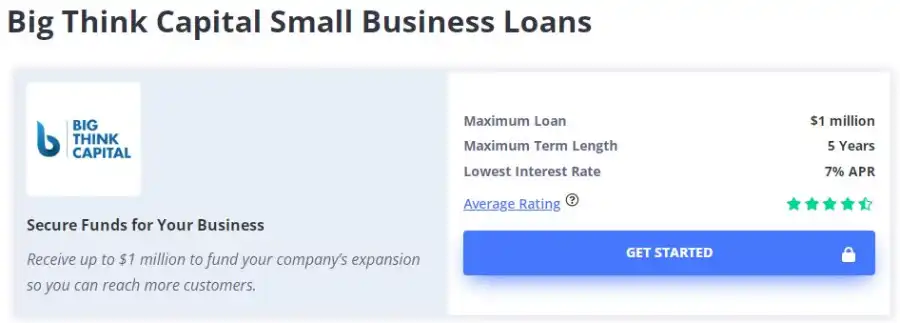Are you a small business owner looking to expand your operations or invest in new equipment? Or, are you launching a startup and are in need of immediate funds? Or are you wondering how to get a loan for a small business loan today?
If so, then you may be considering taking out a loan to help finance your business (growth). When it comes to fueling the growth of your small business, securing a loan can be a game-changer.
But with so many different options (lenders) available, it can be overwhelming to know where to start. Whether you’re launching a startup or a small business or expanding an existing venture, understanding the ins and outs of getting a loan for a small business is crucial.

In this guide, we’ll guide you through the process of how to get a loan for a business, including the different types of loans available, eligibility requirements, and tips for success.
How to Get a Loan for a Small Business
Get A Small Business Loan Today
Getting a loan for a small business involves several steps. Here are a few general guides to help you through the process:
1. Gather Your Business Needs
Before diving into the loan application process, take a moment to gather your business’s financial needs.
Determine how much money you need and what you’ll use it for. Calculate the amount, you require to help you narrow down the types of loans that best suit your needs.
Determine the specific purpose of the loan – whether it’s to fund inventory, expand operations, or cover working capital gaps. It will help you choose the right type of loan.
2. Craft a Solid Business Plan
Prepare a comprehensive solid business plan. Lenders want to see that you have a clear roadmap for success.
Crafting a comprehensive business plan that outlines your business model, target market, competitive analysis, and financial projections is essential. A well-prepared plan not only demonstrates your commitment but also assures lenders that their investment will yield returns.
A well-crafted business plan should include information about your business, market analysis, financial projections, and how you plan to use the loan. A well-structured plan can increase your chances of approval.
3. Check Your Credit Score
Both personal and business credit scores play a significant role in loan approval. Lenders often use these scores to estimate your creditworthiness and measure the risk of lending to you.
Check your credit scores in advance and take steps to improve them if necessary. The higher the credit score the better loan terms and interest rates.
» RELATED: Avoid These Credit Card Mistakes that will hurt your Credit Score
4. Choose the Right Loan Type
Business loans come in various shapes and sizes. Consider options like traditional bank loans, Small Business Administration (SBA) loans, online lenders, microloans, and lines of credit. Each has its pros and cons, so choose the one that aligns with your business’s financial situation and growth goals.
- Traditional Bank Loans: These are offered by banks and credit unions. They usually have lower interest rates but might require strong credit and collateral.
- SBA Loans: The Small Business Administration offers various loan programs with favorable terms. These are partially guaranteed by the government, making them more accessible.
- Online Lenders: Online platforms provide quicker and more flexible options, though they often have higher interest rates.
- Microloans: These are smaller loans offered by non-profit organizations, often aimed at startups and underserved businesses.
- Line of Credit: Similar to a credit card, you’re approved for a certain credit limit and can borrow as needed.
» RELATED: Learn About Hard Money Loans & how they help Real Estate Investors?
5. Gather Essential Documentation
Lenders require documentation to evaluate your loan application. Common documents include your business plan, financial statements, tax returns (both personal and business), and bank statements. Additionally, be prepared to provide collateral documentation if the loan requires it.
Essential documents required: –
- Business Plan
- Financial Statements (balance sheet, income statement, cash flow statement)
- Tax Returns (personal and business)
- Bank Statements
- Collateral Documentation (if required)
6. Research Lenders
Don’t just settle for the first loan offer that comes your way. Better shop around and compare offers from different lenders.
Research multiple lenders to find the best fit for your business. Compare interest rates, repayment terms, fees, and eligibility criteria. This step can save you money and secure better loan terms.

7. Complete the Loan Application Process
Once you’ve chosen a lender, complete the loan application with accurate and updated information. Ensure that you’ve included all necessary documentation as outlined in their requirements.
Double-checking your application can prevent delays and increase your chances of approval.
- Complete your loan application with accurate information.
- Submit the required documentation.
- Some lenders might ask for a personal guarantee or collateral.
8. Wait for Approval
After submitting your application, the lender will review your credit history, financials, and business plan. This process may take some time, so be patient.
If the lender has any additional requirements, promptly provide the requested information.
9. Loan Acceptance
If you’re approved by multiple lenders, carefully review the loan offers. Pay attention to interest rates, repayment terms, and any hidden fees.
Choose the offer that best fits your business needs and financial situation. Follow the lender’s instructions to accept the loan.
Some lenders might have post-approval requirements, such as providing additional documentation or meeting certain conditions.
Steps After Getting a Loan for a Small Business
i). Utilize the Loan for Growth
Once all requirements are met, the lender will disburse the loan funds to your business account.
Upon approval and fund disbursement, it’s time to use the loan strategically for business growth.
Stick to your original plan and avoid diverting funds to unrelated expenses. Responsible utilization can lead to the desired expansion and success.
ii). Responsible and Timely Loan Repayment
Loan repayment is a crucial aspect of maintaining a healthy credit history and a positive relationship with lenders. Make timely payments according to the agreed-upon schedule. Consistent repayment builds your business’s credibility for future financial endeavors. This will help build a positive credit history.
Conclusion
Securing a loan for your small business is a significant step toward achieving your growth ambitions. By following the steps outlined in this guide, you’ll be well-prepared to navigate the loan application process with confidence.
Remember, each decision you make – from assessing your needs to responsible repayment – contributes to the success of your business and your journey as an entrepreneur.
Can You Get a Business Loan with No Credit Check?
There are a few online lenders that may offer business loans with no credit check, but this financing will likely be expensive and costly.
Even if you have a shaky credit history, you may be able to get a business loan with no credit check. Most lenders will check your credit as a part of the application process, some may consider it and waive this requirement, while others will perform only a soft inquiry, which doesn’t affect your credit score.
Those no credit check business loans, however, are typically expensive with high-interest rates, fees, and short duration terms. Also, you should be careful of these predatory lenders’ schemes of “no credit check” loans, as they might have hidden terms that might take advantage of borrowers who are having trouble qualifying for a small business loan.
FAQ – How to Get a Loan for a Small Business
What is the first step in getting a loan for my small business?
The initial step is to assess your business needs. Determine how much funding you require and for what purpose. This helps you choose the right loan type and amount.
Can I get a loan for my startup business?
Yes, many lenders offer loans specifically designed for startups. However, you might need a solid business plan, good credit, and collateral to increase your chances of approval.
How important is my credit score in getting a business loan?
Your credit score is crucial as it reflects your creditworthiness. A higher score generally leads to better loan terms and lower interest rates.
What documents do I need to provide when applying for a business loan?
Commonly required documents include your business plan, financial statements (balance sheet, income statement, cash flow statement), personal and business tax returns, and bank statements.
Best Lenders that Provide You Loans for Small Business
Here are some of the best lenders that provide you loans for small businesses. Carefully analyze these lenders and go through their official sites to learn more.
1. Lendio

Lendio Loan Amount: $5K-$2M
- Time In Business: 1+ years
- Monthly Revenue: $12K+
- Minimum Credit Score: 580
Read a detailed review of Lendio
2. Big Think Capital

Big Think Capital Amount: Upto $5.5 M
- Wide variety of loan products
- Experienced loan officers
- 5-star customer service rating
- Quick and easy application process
- Competitive interest rates
- Get funds in as little as 24 hours
3. LendingTree
LendingTree Loan Amount: $5K-$1M
- Time In Business: 1+ years
- Monthly Revenue: $8K+
- Minimum Credit Score: 500


